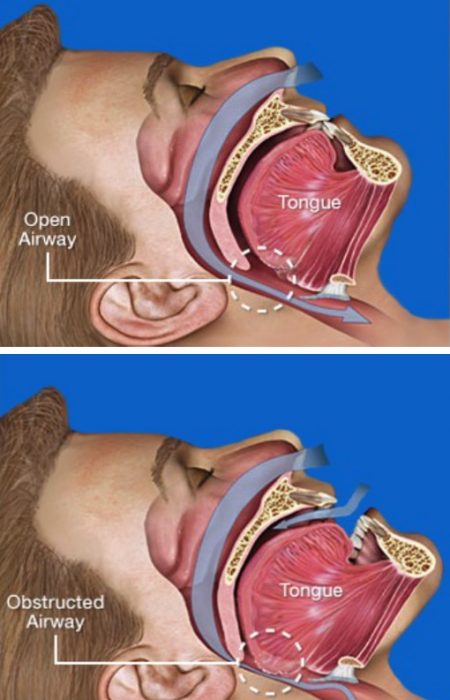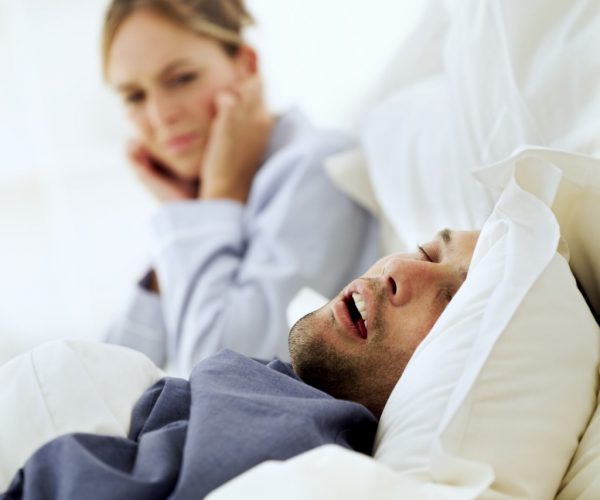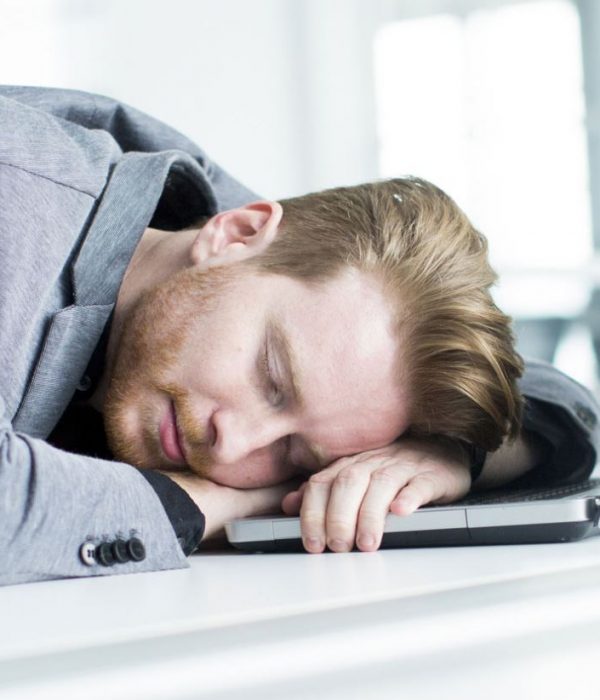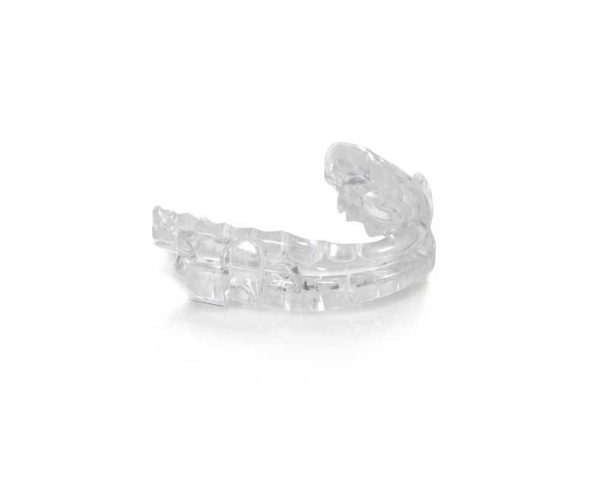Snoring & Sleep Apnea
Snoring is more than just a loud and annoying noise. It can be an indicator of a serious sleep breathing disorder.
Obstructive Sleep Apnea
The most common form of sleep breathing disorder is Obstructive Sleep Apnea (OSA), a medical condition where your tongue and soft tissues close off your airway and stop air from entering your lungs, for up to two minutes at a time. When this happens during sleep, the oxygen in your blood decreases, your heart races and your brain panics – causing you to startle awake. After a few good breaths, the cycle repeats itself, for sometimes hundreds of times a night.
Sleep apnea also keeps you from properly entering REM sleep, the most restorative stage of nightly sleep. Without REM sleep, the brain begins to function less optimally, affecting your memory, your ability to recognize mistakes, your mood, your ability to cope with stress, and even the way you process pain. The noise of sleep apnea causes bed partners to suffer from a lack of sleep leading to crankiness, a lack of alertness and even depression.
When you are sleep and oxygen deprived – the way Sleep Apnea sufferers are – you are not only tired, you are a danger to yourself and others. Driving sleep deprived is as dangerous as driving drunk – over 250,000 motorists fall asleep at the wheel each year, causing an annual average of 8,000 deaths and 60,000 debilitating injuries.
Approximately 38,000 deaths occur on an annual basis that relate to cardiovascular problems that in one way or another are connected to OSA. These problems include high blood pressure, hypertension and stroke, among others.
The American Academy of Dental Sleep Medicine notes that over 18 Million Americans have OSA.


Snoring
Snoring is the primary symptom of Obstructive Sleep Apnea.
During sleep, your tongue and throat tissues may relax enough to narrow your airway. Snoring is the sound that is produced when air passes through this partially blocked area causing tissues to vibrate.
Back sleepers and older patients may also snore, as relaxed or weakened muscle tone allows throat tissues to collapse against each other.
Other reasons for snoring include colds and allergies, which restrict nasal air flow; obesity, where thickened neck tissues put a strain on the throat; and having a relatively large tongue for mouth size, obstructing the airway.
Symptoms of Obstructive Sleep Apnea
Clearly, Sleep Apnea is nothing to ignore. Stopping breathing more than five times an hour can lead to seriously dangerous and unpleasant symptoms, including:
- Mental decline, trouble concentrating, memory problems, or dementia
- Sexual dysfunction
- Increased cancer risk
- High blood pressure, heart attacks and stroke
- Obesity
- Nighttime chest pain
- Gasping, choking, or coughing during sleep
- Excessive daytime sleepiness
- Depression or lack of interest in life
- Morning headaches
- Dry mouth and/or a sore throat in the morning
- Irregular heartbeat

The ProSomnus Sleep Device
Now that you know how dangerous snoring and obstructive sleep apnea can be, what can you do to stop it?
Many people begin by seeing their family doctor and undergoing a sleep study. Often, a CPAP device will be prescribed. The CPAP (Continuous Positive Airway Pressure) therapy device is considered the gold-standard of OSA therapy and some people do well with them, finding instant relief and comfort. Others find sleeping with a mask forcing air into their throats very difficult. Still, others have mild enough sleep apnea or snoring that they don’t need a CPAP but could benefit from deeper sleep and better oxygen intake.
For patients who suffer from only mild airway obstructions that results in snoring, an oral sleep appliance can provide quiet, restful sleep for patients and partners.
For patients who find their CPAP miserable to wear, inconvenient when traveling, or useless when there is no power, such as when camping, an oral sleep appliance can be a lifesaver.
Pinecrest Dental has been successfully treating patients suffering from snoring and Obstructive Sleep Apnea with the slim and comfortable ProSomnus Sleep Device.
Both snoring and obstructive sleep apnea are caused by a collapse of the soft tissues or the tongue into the airway, blocking it and keeping you from taking a proper breath. The ProSomnus Sleep Device work amazingly well by gently advancing your lower jaw and keeping it in a slightly forward position.
The ProSomnus Sleep Device is the smallest and most comfortable oral appliance available. Each device is custom-made with CAD/CAM technology from clear, stain-resistant, metal-free, biocompatible material, to uniquely fit the individual it is fabricated for. Unlike other bulky appliances, it offers plenty of space in your mouth in which your tongue can rest comfortably while you sleep.
Even better, you can open and close your mouth, so you don’t feel trapped in your appliance the way you might in some others. How? The ProSomnus Sleep Device comes in two parts. One arch fits over the upper teeth and one over the lower teeth. These two parts work together to hold your jaw in the ideal position to help you stop snoring.
ProSomnus Sleep Devices were used to successfully treat 71% of OSA patients, including 100% of mild patients, 86% of moderate patients and 42% of severe patients.
Call Pinecrest Dental today, so we can start you on your way to a quieter, healthier and more restful night’s sleep.

The ProSomnus Sleep Device
Now that you know how dangerous snoring and obstructive sleep apnea can be, what can you do to stop it?
Many people begin by seeing their family doctor and undergoing a sleep study. Often, a CPAP device will be prescribed. The CPAP (Continuous Positive Airway Pressure) therapy device is considered the gold-standard of OSA therapy and some people do well with them, finding instant relief and comfort. Others find sleeping with a mask forcing air into their throats very difficult. Still, others have mild enough sleep apnea or snoring that they don’t need a CPAP but could benefit from deeper sleep and better oxygen intake.
For patients who suffer from only mild airway obstructions that results in snoring, an oral sleep appliance can provide quiet, restful sleep for patients and partners.
For patients who find their CPAP miserable to wear, inconvenient when traveling, or useless when there is no power, such as when camping, an oral sleep appliance can be a lifesaver.
Pinecrest Dental has been successfully treating patients suffering from snoring and Obstructive Sleep Apnea with the slim and comfortable ProSomnus Sleep Device.
Both snoring and obstructive sleep apnea are caused by a collapse of the soft tissues or the tongue into the airway, blocking it and keeping you from taking a proper breath. The ProSomnus Sleep Device work amazingly well by gently advancing your lower jaw and keeping it in a slightly forward position.
The ProSomnus Sleep Device is the smallest and most comfortable oral appliance available. Each device is custom-made with CAD/CAM technology from clear, stain-resistant, metal-free, biocompatible material, to uniquely fit the individual it is fabricated for. Unlike other bulky appliances, it offers plenty of space in your mouth in which your tongue can rest comfortably while you sleep.
Even better, you can open and close your mouth, so you don’t feel trapped in your appliance the way you might in some others. How? The ProSomnus Sleep Device comes in two parts. One arch fits over the upper teeth and one over the lower teeth. These two parts work together to hold your jaw in the ideal position to help you stop snoring.
ProSomnus Sleep Devices were used to successfully treat 71% of OSA patients, including 100% of mild patients, 86% of moderate patients and 42% of severe patients.
Call Pinecrest Dental today, so we can start you on your way to a quieter, healthier and more restful night’s sleep.
